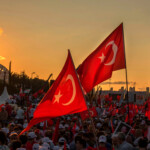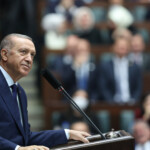Instead of a genuine admission of defeat and soul-searching, the entire opposition has chosen to pretend that “the results were after all not all that bad” and “we should now focus on the local elections” — that are due the end of March 2024.
Three months after the parliamentary and presidential elections, the ugly truth surfaces, adding to the despair and rage of the voters. Not a day passes without the results’ repercussions invading the political arena, creeping like a flood, signaling an unprecedented existential crisis for the opposition. The stage is filled with half-hearted admissions of defeat, revelations of insincerity — and petty calculations which help explain why the so-called “Nation Alliance” was a mere machinery of illusion.
Latest salvos came from Meral Akşener, the leader of the nationalist IYIP (“Good Party”) on Saturday. Her speech was announced beforehand as a “groundbreaking” manifesto by the party, but it amounted to another series of accusations against the opposition bloc itself.
In parts, Akşener sounded apologetic. “We lost the race of changing the partisan presidential system called the ‘Presidential Government System,’” she said. “It has happened for the third time since 2017, 2018 and 2023. 2023 was a chance, we could not use [take advantage of] that chance all together.”
Then, she attacked the very system of alliance building as the reason for failure. “The alliance system mainly harms the dynamics of Turkish politics. Polarized politics increases social polarization and carries water for the mill of the government. Marginal political agendas that suddenly gain value override the demands of societies.”
What she meant by “marginal political agendas,” it became clear as she continued, was the existence and role of the pro-Kurdish political movement.
She clarified:
“The biggest problem I see in the alliance system is the biggest national security problem; the efforts of separatist structures to infiltrate the system. We have been against this since the first day, we reject the unprincipled politics that is directed only to obtain the numerical majority, which is not clear who is with whom. At the end of the last election process, as IYI Party, we have realized clearly that a ‘national politics’ is not possible within this structure of the alliance system. A sustainable success is not possible within the structure of the alliance system.”
Though it may sound strange that Akşener attacks the notion of alliance, her real objective is clear—and revealing. She knows perfectly well that a considerable part of the 48 percent vote for Kemal Kılıçdaroğlu, Tayyip Erdoğan’s rival in the presidential race, came from the voters of the pro-Kurdish HDP/YSP, but for the sake of profiling herself as a potential force in Turkey’s shift to deeper nationalism, she sees no other way than rejecting all her engagement before the elections. But the revelation is clear: By doing so, Akşener, “number two at the opposition’s Table of Six” signals that she is now closer to Erdoğan and Bahçeli’s power bloc than the others. In other words, IYIP repositions itself as a “joker” in the political game from now on.
Instead of a genuine admission of defeat and soul-searching, the entire opposition has chosen to pretend that “the results were after all not all that bad” and “we should now focus on the local elections” — that are due the end of March 2024.
The question is what to do until then. The main-opposition party, the CHP, has not only suffered profoundly after the elections, but also has been dragged into acrimonious and insidious infighting because of Kılıçdaroğlu’s refusal to resign, all of which continues to cause deep disappointment amongst its electorate.
This is significant. The results left the tiny, insignificant four members of the opposition bloc rather unmoved, because their votes cumulatively were no more than 2-3 percent. Akşener’s IYIP had anyhow consistently lost support in the year preceding the May 2023 elections, from 18 to 10 percent (hence her desperate efforts to re-brand herself), but the mood spreading after each trivial fight within the CHP (whose 25 % support is still meaningful) leads to depoliticization. According to Bekir Ağırdır, the founder of the respected pollster KONDA:
“At this point, trying to understand and make sense of politics has become unexciting” he wrote for Gazete Oksijen. “Politics has lost its emotional base. Political articles are no longer read, political debates are no longer watched. In a way, society seems to prefer depoliticization.”
Academic Öztürk Armağan agreed. In an article published by the pro-CHP site, Politikyol, he lashes out at the elite and at the profound apathy amongst the opposition voters:
“It has become meaningless to criticise the government or to be angry with the opposition. Because no matter what you do, the situation does not change. On the surface it looks like a relentless fight. But in reality we are faced with a system, where everyone plays their own role. The ruling and opposition elites are content. In terms of where we are now, the most important political stance has become an apolitical one. Because people are tired of this zero-sum game,” he wrote.
What to expect now? It is clear that each and every party in the opposition will join the local elections separately, with their own candidate. Aside from the IYIP, three other parties from the six-party bloc have already declared the “death of the alliance”. The pro-Kurdish HDP/YSP has hidden itself into silence for three months, not having had to confront the critique that it should have nominated Selahattin Demirtaş as its own contender in the first place. But it is clear that this party will also join the local elections in 2024 with its own candidates. Congresses await both the CHP and HDP/YSP, but the question remains whether or not these two parties will be able to get themselves out from the quagmire the elections pushed them into.
The ugly infighting does not help Ekrem Imamoğlu, the mayor of Istanbul, in his plans to challenge Erdoğan. He is no longer hopeful to be elected as the leader of the CHP and, after Akşener’s distancing from what she calls “separatist structures” (namely the HDP/YSP), he has no chances to “keep” Istanbul without the Kurdish vote.
But Erdoğan’s camp does not seem to leave anything to chance: recently, two judges in the appeals court in the legal cases against Imamoğlu were replaced by the Judges and Prosecutors Council, controlled by the government.
The views and opinions expressed above are the author’s and do not represent those of the Free Turkish Press.


